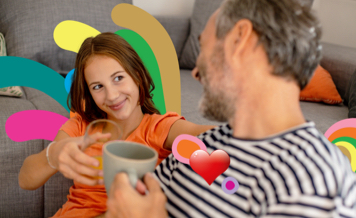How to cope with grief and loss
Have you or someone you care about experienced a loss? Here, we look at some common questions about grief and loss, as well as when and where to get support if you need it.
Jump to section: Signs and symptoms | Causes | Coping strategies | Stages of grief | Where to get help
What is grief?
Grief is a natural response to loss. It can affect your thoughts, emotions, relationships and even your body. Everyone experiences grief differently. Some people might feel intense sadness, while others might feel numbness, anger or guilt. There’s no right or wrong way to grieve – and no set timeline for feeling better.
What are common symptoms of grief?
Grief is often complex and it’s normal to have a range of feelings after a loss.
Some common reactions to grief are:
- anger
- confusion
- changes to sleep or appetite
- difficulty concentrating
- guilt
- headaches
- loneliness
- low self-esteem
- numbness
- panic
- relief
- sadness
- shock
It’s important to remember that there is no right way to grieve. You might feel all these emotions, or some, or none. Everyone’s experience of grief is different.

What causes grief?
Grief can follow many kinds of loss, not just the death of a loved one. It’s a common and valid response to a significant change or disruption in life. You might grieve:
- the end of a relationship or friendship
- a job loss
- a serious illness or health diagnosis
- the loss of a pet
- a change in identity, lifestyle or plans.
These types of losses can be just as painful as the loss of a loved one. Grief is less about what was lost and more about the meaning it held for you. It’s important to acknowledge these experiences and give yourself permission to grieve. Your feelings are valid, and support is always available if you need it.
How long does grief last?
There is no timeframe for grief. Some people might start to feel more like themselves after a few days or weeks. For others, it can take much longer.
Many people notice that grief changes over time. The intensity of feelings may ease, or it may come and go. Some days can be harder than others, especially around anniversaries, holidays or unexpected reminders of the person or thing you’re grieving for.
Let yourself grieve at your own pace – there’s no rush.
How to cope with grief and loss
There is no ‘cure’ for grief but there are different ways to try and cope with what you’re feeling. You may need to try a few strategies to find out what works best for you.
Let yourself cry if you need to
Crying is a natural response to grief. Cry if you need to, but remember not everyone does, and that’s okay too.
Connect with your friends and loved ones
If you’ve experienced the same loss as someone else, it might help to talk, share memories or grieve together.
Allow yourself to spend time alone
Grief can be exhausting. You might like to set aside time to reflect on or express your feelings, such as in a diary or journal.
Move your body
Exercising or getting active can help boost your mood and serve as a necessary reprieve from what you’re feeling.
Practise self-care
Make time for activities that you enjoy or that bring you calm, whatever that looks like for you.
If you’re supporting someone who is grieving, small acts like initiating contact, listening, cooking meals or sending flowers can let them know you’re there for them.

24/7 Medibank Mental Health Support
Medibank health insurance members can chat to a mental health professional about how they feel and ask questions about a range of mental health concerns for themselves or a loved one and get guidance on what they can do next. Chat online or call 1800 644 325 anytime of the day or night, 7 days a week at no extra cost.~
What are the five stages of grief?
The five stages of grief (also called the Kübler-Ross model of grief) are denial, anger, bargaining, depression and acceptance. While this model has helped some people make sense of their experiences, it’s not a checklist or sequence that everyone follows.
Grief is often more complex. You may move back and forth between emotions, or experience them all at once. Some people never go through these ‘stages’ at all.
What matters most is recognising that whatever you’re feeling is valid. Grief is individual, and how you grieve may look different to how someone else does, even if you’ve experienced the same loss.
When to seek help
It’s normal to feel sad and low while you’re grieving, but if you’re having persistent feelings of sadness and despair, you may be experiencing symptoms of depression.
Some signs that you may need to seek help include:
- intense sadness
- hopelessness
- feelings of emptiness or despair.
If you or someone you care about has had these symptoms for two weeks or more, see your doctor or a mental health professional for support.
Where to get help
If your life or someone else’s is in danger, call 000 immediately.
If you’re in distress and need help, call Lifeline on 13 11 14 for 24/7 crisis support.
For non-emergency support, your GP or regular health practitioner is often the best place to start. They will be able to assess your individual situation and recommend the best next steps for your recovery.
Medibank health insurance members can chat to a mental health professional about how they feel and ask questions about a range of mental health concerns for themselves or a loved one and get guidance on what they can do next. Chat online or call 1800 644 325 anytime of the day or night, 7 days a week at no extra cost*.
Remember that help is always available, no matter the situation.
How can we help?
I want to know how my cover supports mental health
I need help and want to talk
Related articles
Things you need to know
*Some referred services may involve out of pocket costs and waiting periods may apply.
While we hope you find this information helpful, please note that it is general in nature. It is not health advice, and is not tailored to meet your individual health needs. You should always consult a trusted health professional before making decisions about your health care. While we have prepared the information carefully, we can’t guarantee that it is accurate, complete or up-to-date. And while we may mention goods or services provided by others, we aren’t specifically endorsing them and can’t accept responsibility for them. For these reasons we are unable to accept responsibility for any loss that may be sustained from acting on this information (subject to applicable consumer guarantees).
.png)





